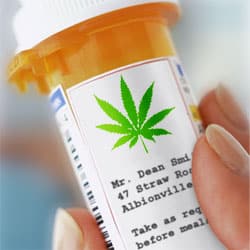 Mitch McConnell Thinks Marijuana Causes Death
Mitch McConnell Thinks Marijuana Causes Death
I just read a media report that exemplifies the stupidity that permeates the halls of Washington D.C. The Huffington Post has a story out today talking about how Senate Minority Leader Mitch McConnell (R-Ky) told a constituent via letter that he doesn’t support the idea of marijuana legalization because marijuana can lead to death.
There was a copy of the Mitch McConnell letter posted to grasscity.com by the constituent, which stated, “Hi Blades, got a letter back from Mitch McConnell about legalizing marijuana. I’ll let the letter speak for itself. WOWZA.” Below is the letter:
What an idiot right? Did Mitch McConnell actually think that this was a sufficient answer? When are we going to see a reefer madness politician admit the truth – they make more money opposing marijuana legalization than they do supporting it, so they will never support marijuana legalization as long as that’s the case. While I think that’s almost as ridiculous as the response Mitch McConnell gave, it would be a breathe of fresh air compared to the constantly BS that they always say.
Let’s analyze what Mitch McConnell wrote. The second paragraph states, “I have serious concerns about proposals to legalize marijuana for medicinal purposes. First, synthetic tetrahydrocannabinol, the primary ingredient in marijuana, is currently available in pill for for the treatment of HIV wasting syndrome and other illnesses.”
 Politicians who are too lazy to educate themselves on the deficiencies of Marinol should be banned from talking about it, because it is a danger to society. What if people actually believed Marinol was the end all of medical marijuana, and relied solely on it to provide the benefits that raw cannabis provides? They would be putting themselves in harms way, as Marinol is not the same thing as real marijuana. Below is stellar information that proves why Marinol is not as good as real marijuana:
Politicians who are too lazy to educate themselves on the deficiencies of Marinol should be banned from talking about it, because it is a danger to society. What if people actually believed Marinol was the end all of medical marijuana, and relied solely on it to provide the benefits that raw cannabis provides? They would be putting themselves in harms way, as Marinol is not the same thing as real marijuana. Below is stellar information that proves why Marinol is not as good as real marijuana:
Introduction
Marinol1 (dronabinol) is the only US FDA-approved synthetic cannabinoid. It is often marketed as a legal pharmaceutical alternative to natural cannabis.
Marinol is manufactured as a gelatin capsule containing synthetic delta-9-tetrahydrocannabinol (THC) in sesame oil. It is taken orally and is available in 2.5mg, 5mg and/or 10mg dosages. Marinol may be prescribed for the treatment of cachexia (weight loss) in patients with AIDS and for the treatment of nausea and vomiting associated with cancer chemotherapy in patients who have failed to respond adequately to conventional antiemetic treatments.
Despite FDA approval2, Marinol typically provides only limited relief to select patients, particularly when compared to natural cannabis and its cannabinoids. Marinol should remain a legal option for patients and physicians; however, federal and state laws should be amended to allow for those patients who are unresponsive to synthetic THC the ability to use natural cannabis and its cannabinoids as a medical therapy without fear of arrest and/or criminal prosecution. By prohibiting the possession and use of natural cannabis and its cannabinoids, patients are unnecessarily restricted to use a synthetic substitute that lacks much of the therapeutic efficacy of natural cannabis.
Marinol Lacks Several of the Therapeutic Compounds Available in Natural Cannabis
Chemical compounds in cannabis, known as cannabinoids, are responsible for its numerous therapeutic benefits. Scientists have identified 66 naturally occurring cannabinoids.3
The active ingredient in Marinol, synthetic delta-9-tetrahyrdocannabinol (THC), is an analogue of one such compound, THC. However, several other cannabinoids available in cannabis – in addition to naturally occurring terpenoids (oils) and flavonoids (phenols) – have also been clinically demonstrated to possess therapeutic utility. Many patients favor natural cannabis to Marinol because it includes these other therapeutically active cannabinoids.
For example, cannabidol (CBD) is a non-psychoactive cannabinoid that has been clinically demonstrated to have analgesic, antispasmodic, anxiolytic, antipsychotic, antinausea, and anti-rheumatoid arthritic properties.4
Animal and human studies have shown CBD to possess anti-convulsant properties, particularly in the treatment of epilepsy.5 Natural extracts of CBD, when administered in combination with THC, significantly reduce pain, spasticity and other symptoms in multiple sclerosis (MS) patients unresponsive to standard treatment medications.6
Clinical studies also demonstrate CBD to be neuroprotective against glutamate neurotoxicity7 (i.e. stroke), cerebral infarction8 (localized cell death in the brain), and ethanol-induced neurotoxicity,9 with CBD being more protective against glutamate neurotoxicity than either ascorbate (vitamin C) or alpha-tocopherol (vitamin E).10 Clinical trials have also shown CBD to possess anti-tumoral properties,11inhibiting the growth of glioma (brain tumor) cells in a dose dependent manner and selectively inducing apoptosis (programmed cell death) in malignant cells.12
Additional cannabinoids possessing clinically demonstrated therapeutic properties include: cannabinol (anticonvulsant13 and anti-inflammatory14 activity); cannabichromine (anti-inflammatory15 and antidepressant16 activity); and cannabigerol (anti-tumoral17 and analgesic18 activity). Natural cannabis’ essential oil components (terpenoids) exhibit anti-inflammatory properties19 and its flavonoids possess antioxidant activity.20 Emerging clinical evidence indicates that cannabinoids may slow disease progression21 in certain autoimmune and neurologic diseases, including multiple sclerosis22 (MS), Amyotrophic Lateral Sclerosis23 (Lou Gehrig’s disease) and Huntington’s Disease.24
Clinical data indicate that the synergism of these compounds is likely more efficacious25 than the administration of synthetic THC alone.26 For example, McPartland and Russo write: “Good evidence shows that secondary compounds in cannabis may enhance beneficial effects of THC. Other cannabinoid and non-cannabinoid compounds in herbal cannabis … may reduce THC-induced anxiety, cholinergic deficits, and immunosuppression. Cannabis terpenoids and flavonoids may also increase cerebral blood flow, enhance cortical activity, kill respiratory pathogens, and provide anti-inflammatory activity.”27 In an in vitro model of epilepsy, natural cannabis extracts performed better than THC alone.28In human trials, patients suffering from multiple sclerosis experienced greater symptomatic relief from sublingual natural cannabis extracts than from the administration of oral THC.29 In 2005, Health Canada approved the oral spray Sativex30 — which contains precise ratios of the natural cannabinoid extracts THC and CBD, among other compounds – for prescription use for MS-related symptoms.31
 Marinol is More Psychoactive Than Natural Cannabis
Marinol is More Psychoactive Than Natural Cannabis
Patients prescribed Marinol frequently report that its psychoactive effects are far greater than those of natural cannabis. Marinol’s adverse effects include: feeling “high,” drowsiness, dizziness, confusion, anxiety, changes in mood, muddled thinking, perceptual difficulties, coordination impairment, irritability, and depression.32 These psychoactive effects may last four to six hours.33 About one-third of patients prescribed Marinol report experiencing one or some of these adverse effects.34
Marinol’s oral route of administration is responsible, in part, for its heightened psychoactivity compared to inhaled cannabis. Once swallowed, Marinol passes from the stomach to the small intestine before being absorbed into the bloodstream. Following absorption, Marinol passes through the liver where a significant proportion of the drug is metabolized into other chemicals.35 One of these chemicals, 11-hydroxy-THC, may be four to five times more potent than natural THC,36 and is produced in greater quantities.37 Thus, patients administered Marinol experience the psychoactive effects of both THC and 11-hydroxy-THC, greatly increasing the likelihood that they will suffer from an adverse psychological reaction. By comparison, only minute quantities of 11-hydroxy-THC are produced when cannabis is inhaled.38 Moreover, Marinol lacks the compound cannabidiol, which possesses anxiolytic activity and likely modifies and/or diminishes much of THC’s psychoactivity in natural cannabis.39
Cannabis Vaporization Offers Advantages Over Orally Administered THC
Vaporization is an alternative method of cannabis administration that holds distinct advantages over both smoking and oral administration. Cannabis vaporization suppresses respiratory toxins by heating cannabis to a temperature where cannabinoid vapors form (typically around 180-190 degrees Celsius), but below the point of combustion where noxious smoke and associated toxins (i.e., carcinogenic hydrocarbons) are produced (near 230 degrees Celsius).40 Although a comprehensive review of cannabis and health conducted by the National Academy of Sciences Institute of Medicine found “no conclusive evidence that marijuana causes cancer in humans, including cancers usually related to tobacco use,”41 studies have found that heavy cannabis smokers face a higher risk of contracting bronchitis and respiratory illnesses.42 This risk is likely not due to the inhalation of cannabinoids, but rather to the exposure of noxious smoke. Because vaporization can deliver therapeutic doses of cannabinoids while reducing the users intake of pyrolytic smoke compounds, it is considered to be a preferred and likely safer method of cannabis administration than smoking.43
In practice, cannabis vaporization offers considerable advantages over oral THC consumption. While the oral ingestion of Marinol avoids the potential risks of smoking, it has significant drawbacks. Because of synthetic THC’s poor bioavailability, only 5-20 percent of an oral dose ever reaches the bloodstream44 and the drug may not achieve peak effect until four hours after dosing.45 Moreover, because Marinol is metabolized slowly, its therapeutic and psychoactive effects may be unpredictable and vary considerably, both from one person to another, and in the same person from one episode of use to another.46 By contrast, cannabis vaporization delivers cannabinoids to the bloodstream almost instantaneously.47 Vaporization’s rapid onset also allows patients to self regulate their dosage of cannabinoids by immediately ceasing inhalation when/if their psychoactive effects become unpleasant.48After oral administration of Marinol, patients have no choice but to experience the full psychoactive effects of the dose consumed. These dysphoric effects may last several hours.
Because of its rapid onset, vaporized cannabis is more desirable than Marinol for patients requiring a fast-acting therapeutic agent, such as those combating oncoming attacks of nausea, seizures or muscle spasms. Cannabis vaporization also offers a unique advantage to patients suffering from nausea and vomiting because it allows them an alternative delivery route to swallowing. Cancer and HIV/AIDS patients often report that their stomachs cannot hold down Marinol capsules during bouts of severe nausea49 and many rely on natural cannabis and cannabinoids for symptom control.50 In a 1994 survey of oncologists, respondents ranked synthetic THC ninth on a list of available antiemetic medications.51In another survey of oncologists, 44 percent of respondents said that they believed natural cannabis to be more efficacious than oral synthetic THC; only 13 percent of respondents rated Marinol more effective.52 A 1997 survey of physicians found that a majority preferred megestrol acetate over Marinol as an appetite stimulant in patients with HIV/AIDS.53
As a result of Marinol’s slow onset and poor bioavailablity, scientists are now in the process of developing a new formulation of pulmonary dronabinol, delivered with a pressurized metered dose inhaler.54 In a Phase I study, pulmonary Marinol delivered via an inhaler provided rapid systemic absorption. Unlike oral synthetic THC, it’s possible that pulmonary Marinol “could offer an alternative for patients when a fast onset of action is desirable.”55 However, FDA approval of pulmonary Marinol and/or its inhaler remains years away. Sativex, an oral cannabis spray consisting of natural cannabinoid extracts, has greater bioavailability and is faster acting than oral synthetic THC. Clinical trials comparing its bioavailability and time of peak onset compared to vaporized cannabis have not been performed, though anecdotal reports indicate that vaporized cannabis and its cannabinoids likely possess greater bioavailability and are faster acting than the Sativex spray.
Marinol is More Expensive Than Natural Cannabis
Synthetic THC is a costly and difficult compound to manufacture.56 Much of this cost is passed on to the patient consumer, particularly if the full cost of Marinol (approximately $200 to $800 per month,57depending on the dosage) is borne out of pocket. Patients, particularly those with chronic conditions, often report that Marinol’s market cost limits their use of the drug.58 Doctors also report that Marinol’s high cost dissuades them from prescribing it to patients. In one survey of HIV/AIDS specialists, among respondents who had never prescribed Marinol to their patients, 33 percent cited the high cost of the drug as the reason.59 Natural cannabis, even at its inflated black market value, often remains far less costly for patients than oral synthetic THC.60
Patients Ultimately Prefer Natural Cannabis to Marinol
In the 1970s and 1980s, several states conducted patient trials61 of natural cannabis’ effectiveness as an anti-emetic in cancer patients unresponsive to conventional therapies. Some state protocols allowed patients to choose between inhaled cannabis62 and synthetic THC. In those studies which compared natural cannabis to dronabinol, inhaled cannabis was equal to or better than the oral administration of synthetic THC.63
For example, researchers at the Tennessee Board of Pharmacy found a “23 percent higher success rate among those patients smoking than among those patients administered THC capsules” in the treatment of nausea and/or vomiting associated with cancer chemotherapy.64
Researchers in New Mexico observed similar findings. “When the routes of [drug] administration were analyzed separately, it was found that inhalation was far superior to ingestion: 90.39 percent of the patients in the group that inhaled the marijuana showed improvement while only 59.65 percent of the patients in the group that orally ingested the delta-9-THC showed improvement,” they concluded.65
Researchers at the California Board of Pharmacy found that inhaled cannabis and oral THC produced similar results in patients. However, physicians still rated natural cannabis as slightly more effective than oral THC as an anti-emetic.66
A 1988 New York State pilot study comparing inhaled cannabis to oral THC in cancer chemotherapy patients who were unresponsive to standard antiemetic agents found: “Twenty-nine percent of patients who failed oral THC responded to the cigarette form. … Our results demonstrate that inhalation marijuana is an effective therapy for the treatment of nausea and vomiting due to cancer chemotherapy.”67
Today, several patient populations continue to use natural cannabis and its cannabinoids in large numbers despite its illegality and the availability of Marinol. A 2005 British survey of more than 500 HIV/AIDS patients found that one-third of respondents use natural cannabis for symptomatic relief, with more than 90 percent of them reporting that it improves their appetite, muscle pain and other symptoms.68 A previous US survey found that approximately one out of four patients with HIV had used natural cannabis medicinally in the past month.69
Cannabis use is also prevalent among patients with neurologic disorders. Nearly four out of ten Dutch patients with prescriptions for “medical grade cannabis” (cannabis provided by Dutch pharmacies with a standardized THC content of 10.2 percent) use it to treat MS or spinal cord injuries, according to survey data published in 2005 in the journal Neurology.70 Perceived efficacy is greater among respondents who inhale cannabis versus those who ingest it orally, the study found.71
A 2002 British survey of MS patients found that 43 percent of respondents used natural cannabis therapeutically, with about half admitting they used it regularly.72 Seventy-six percent said they would do so if cannabis were legal.73 A Canadian survey of MS patients found that 96 percent of respondents were “aware cannabis was potentially therapeutically useful for MS and most (72 percent) supported [its] legalization for medicinal purposes.”74 Sixteen percent of respondents answered that they use natural cannabis for medical purposes to treat symptoms of anxiety/depression, spasticity and chronic pain.75
A more recent Canadian survey published in Neurology reported that 14 percent of MS76 patients and 21 percent of respondents with epilepsy had used medical cannabis in the past year.77 Among epileptics, twenty-four percent of respondents said that they believed that cannabis was an effective therapy for the disease.78 A 2002 survey of patients with Parkinson’s Disease (PD) found that 25 percent of respondents had tried cannabis, with nearly half of those saying that it provided them symptomatic relief.79
Conclusion
Oral synthetic THC, legally available by prescription as Marinol, often provides only limited relief to a select group of patients, particularly when compared to natural cannabis and its cannabinoids. Patients often experience minimal relief from Marinol and many experience unwanted side effects. In addition, many physicians are hesitant to prescribe the drug, and some patients are unable to afford it. Despite Marinol’s legality, many patient populations continue to risk arrest and criminal prosecution to use natural cannabis medically, and most report experiencing greater therapeutic relief from it.
The active ingredient in Marinol is a synthetic analogue of only one of the compounds in cannabis that is therapeutically beneficial to patients. By prohibiting the possession and use of natural cannabis and its cannabinoids, patients are unnecessarily burdened to use a synthetic substitute that lacks much of the therapeutic efficacy of natural cannabis and its cannabinoids.
Marinol should remain a legal option for patients and physicians and the development of additional cannabis-based pharmaceuticals should be encouraged. However, federal and state laws should be amended to allow for those patients who are unresponsive to synthetic THC, or simply desire an alternative to oral dronabinol, the ability to use natural cannabis and its cannabinoids as a legal medical therapy without fear of arrest and/or criminal prosecution.
To see the end notes, click this link, as there are a lot of them!
The second ridiculous thing that Mitch McConnell stated was, “Second, I am troubled by the manner in which many of the legalization proposals make marijuana available to the public without following the scientific processes of the Food and Drug Administration (FDA).” I never thought I would say this, but I actually agree with Mitch McConnell for once. I too am troubled by the requirement that society is going to have to vote in marijuana legalization because the feds refuse to allow the ‘scientific processes of the Food and Drug Administration’ to occur. Note to Mitch – if you are going to stick your head in the sand and refuse to allow the FDA to research marijuana, you can’t also use it as an argument for your stance. That’s like saying that the only way you will agree that something is valid is if it is researched more, yet never allow such research. I will never believe Mitch McConnell is a human unless there are rigorous studies done, however, I will never support such studies…see what I mean?
The reefer madness was not over though. As you read in Mitch McConnell’s letter, he actually kind of taunts the medical marijuana community by saying, “It may interest you to know that the Senate considered legislation to regulate the use of medicinal marijuana when it debated the FDA Revitalization Act of 2007. This legislation would have required the FDA to review the safety and efficacy of medical marijuana, as it does with nearly all drugs, before approving its use by consumers. This provision was not included in the final version of this bill, which was singed into law on September 27, 2007.”
Well Mitch McConnell, it may interest you to know that you lack compassion, dignity, and logical reasoning. The fact that the “legislation would have required the FDA to review the safety and efficacy of medical marijuana, as it does with nearly all drugs, before approving its use by consumers,” yet it was “not included in the final version of the bill” is ludicrous. The only thing more ludicrous is the fact that Mitch McConnell provided no explanation or support for such an illogical action. Congress knows that there are millions of people consuming marijuana for medicinal purposes, and recognizes that the ‘safety and efficacy of medical marijuana’ is a worthwhile thing to talk about, but does not think it is worth actually researching. What does that say about Congress’ view of citizen’s safety??
Mitch McConnell finishes his letter with a classic anti-marijuana strategy – lumping marijuana in with all drugs in order to demonize it. Mitch McConnell writes, “Because of the harm that substances like marijuana and other narcotics pose to our society, I have concerns about this legislation (referring to the States’ Medical Marijuana Patient Protection Act). The detrimental effects of drugs have been well documented: short-term memory loss, loss of core motor functions, heightened risk of lung disease, and even death.”
Does Mitch McConnell suffer from schizophrenia? He starts off talking about a medical marijuana bill, then refers to ‘other narcotics’, then goes back to marijuana talking about short-term memory loss and core motor functions, then refers to lung disease (marijuana does not cause lung cancer), and then refers to death. I read stupid political comments all day everyday, and even I had trouble following Mitch McConnell.
For the second time in my life, I agree with Mitch McConnell. I too recognize that the ‘detrimental effects of drugs have been well documented.’ Heroin, cocaine, pharmaceuticals, meth, and REAL drugs are detrimental to society, and have resulted in death. However Mitch, marijuana does not fall into that same category, and it would make you look more intelligent if you stuck to the conversation at hand. The constituent that contacted you, as well as all marijuana activists, are talking about marijuana. We are not talking about crack, despite your attempts to divert the conversation in that direction.
At the closing of Mitch McConnell’s letter, he asks the constituent to become a fan of his Facebook page. Seriously? I had half a mind to ‘like’ his page just so I could post comments on the wall of his page…I recommend ALL marijuana activists ‘like’ Mitch McConnell’s Facebook page, then inundate it with your comments about how you feel about his marijuana comments. You don’t have the ability to post direct wall posts, but you can comment on all of his posts. Ninjasmoker and I did this to Chris Dudley when he ran for Governor in Oregon in 2010. Because these politicians are lazy, and are only on FB to try to seem genuine, they rarely monitor their comments. What do you say, want to join me? I’m going to punk Mitch McConnell’s fan page, if you love marijuana, please do so yourselves!
***After I published this post, a fellow FB friend pointed out that you don’t have to ‘like’ Mitch’s page to comment. Even better! I don’t want to ‘like’ anything about this guy! Vote this bum out!***



























